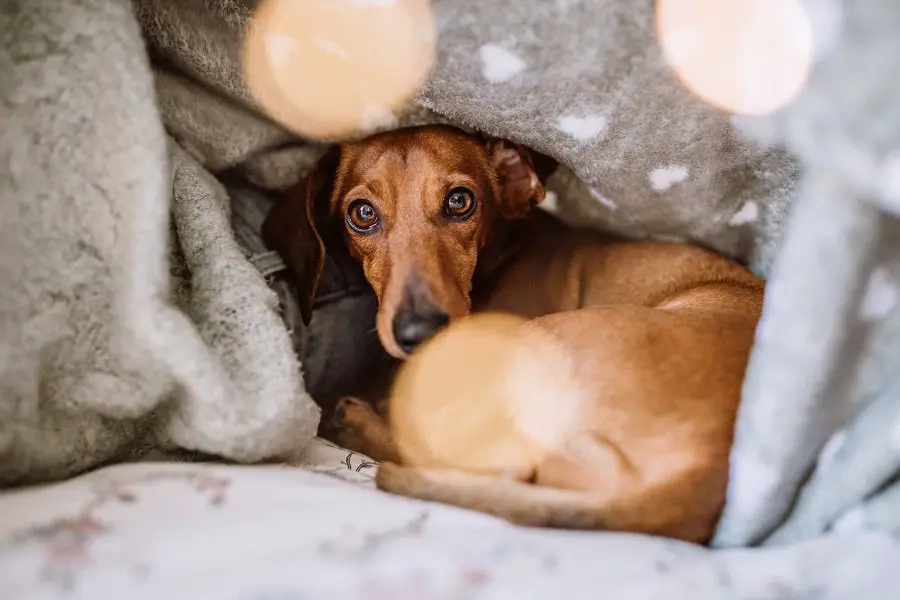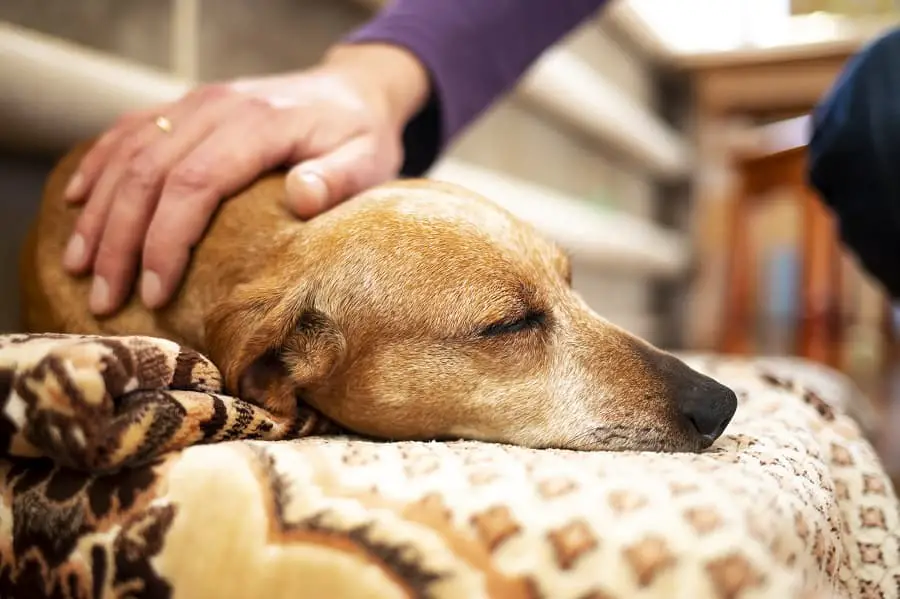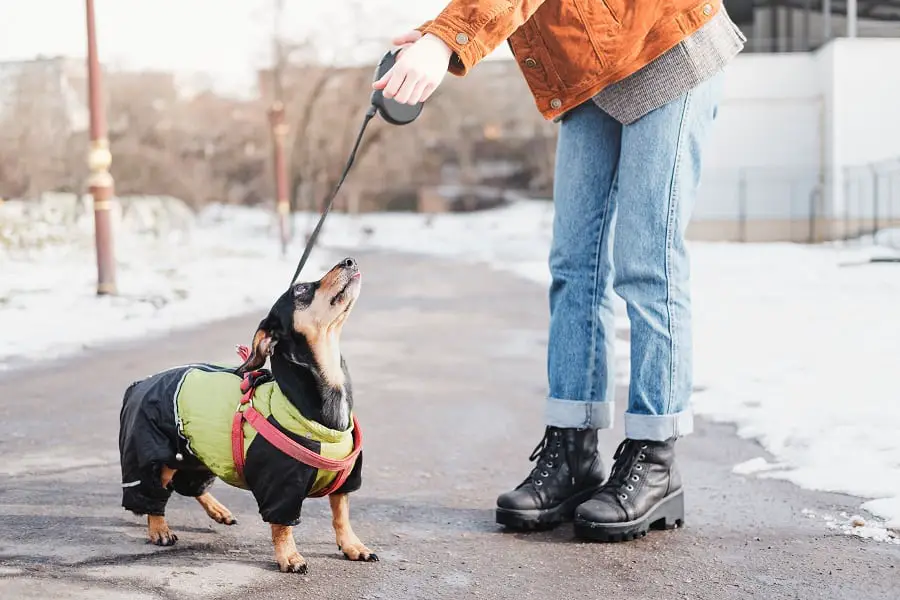Dachshunds are one of the best companion dogs, and their playful and jovial nature makes them even more graceful and stunning. But, what if your cool companion becomes annoyingly helpless and clingy?
Just like other breeds, doxies can also become dependent and penniless at times. And when this happens, they might begin accompanying you to every corner of your home. They might also insist on staying by your side all day. And, they will probably be excited every time they see you around.

Some people argue that limited clinginess is good, and they like being followed by their pets. However, if clinginess gets intense, your short-legged, playful friend might become a trouble-maker for you.
Many pet parents take clinginess lightly and don’t think of other underlying issues that trigger it. They take this dependence and neediness (of their dachshunds) as a way of expressing love, but in fact, it’s an indicator that your wiener is going through some trouble.
One major issue that pet-owners often confuse with clinginess is separation anxiety. Separation anxiety can cause clinginess to your doxie, but it’s not always the case.
Let’s find out the 7 reasons that trigger clinginess in your dachsie.
1 – Watch out for Separation Anxiety
Separation anxiety is often considered similar to clinginess, but it’s a different thing. It can be caused by clinginess, but not all clingy datsuns have separation anxiety. It can develop when your sausage’s clinginess is left untreated.
The major difference between clinginess and separation anxiety is panic, aggression, and anxiety of being left alone. Clingy doxies don’t panic when you leave them alone, but the ones suffering from separation anxiety go mad when they’re left alone.
Upon being left alone, a dachshund with separation anxiety will go mad, panic, destroy nearby objects in anger, urinate, and pace around in the house.
If your dachsie has shown symptoms of clinginess, the best thing you can do is begin treating his clinginess, so it doesn’t progress and turn into separation anxiety.
If your clingy wiener panics upon being left alone and shows signs of anxiety and aggression, it’s time you seek the help of a veterinarian.
2 – Your Datsun is Suffering from Illness
Dachshunds, just like many other breeds, are more vulnerable and seek protection when they’re ill, infected, or traumatized. They might want to be in your company all day long.
Illness can weaken your doxin, and he might want to cling to you for security and comfort. They are small, fun-loving, and lively creatures when they’re in perfect health. But, when illness strikes, they become over-reliant on you and won’t leave you alone.
If you look into the behavioral traits of dachshunds, you will find out action-loving and fun-loving creatures that also like little acting. They love being the chief member of their ‘hooman-family’ and cherish having all eyes on them.
However, if your doxin is not scampering around with fun, and is suddenly showing signs of mild anxiety, neediness, and increased dependence, then you should be concerned about their health and discover possible treatments in time.
3 – Aging Health Issues

Old age could be another reason your cheerful and upbeat wiener is becoming over-reliant and insecure. Old age brings its problems and limitations to doxins, just like it does to humans.
Your dachshund that was once young, agile, and energetic, is now becoming lazy, losing strength, and going through other symptoms of old age, such as weakened eyesight and impaired hearing. Besides hearing and vision impairment, you should also take good care of his weight. Take him out for a 15-20 minute walk regularly.
Dachshunds will become more dependent on you when growing older. They look for reassurance and comfort because they have not experienced such feelings before.
So, when your wieners are having aging issues, the best thing you can do is spend time with them and take care of their comfort, weight, and physical stimulation to keep them from getting bored. Doxies love to play and would never say no to playing fetch with you.
Take them out there, go playing fetch, and take them out on walks with you. Appropriate physical training and a balanced diet can keep your datsun healthy and calm.
4 – Disturbed by a Change in Routine
A change in routine can upset your doxins just like it upsets humans. This change may include a new sleeping place, a change in meal times, or a change in playing and exercise routines.
They are happy when they have a routine and know what’s coming their way at what time. They love to know what time you’re going to feed them, what time they’ll get a shower, and when they’re going out for a walk with their favorite hooman.
However, if their routine is disturbed or changed drastically, they couldn’t cope up with it and begin showing signs of stress, anxiety, and sometimes, aggression. Don’t be surprised if they become clingy after finding a new home, a different meal plan, or a new pet in the house.
They expect you to provide everything in time and follow the routine they’re comfortable with. They are a little bossy and like things in a consistent routine. If you keep on making changes, your doxie will not adjust and end up being stressful and needy.
Therefore, the key takeaway is not changing everything all of a sudden. If it’s necessary, make small changes and familiarize your Datsun to see how he responds. If your little bud accepts the changes, you can continue with the new routine.
5 – Your Little-wiener is Stressed

Stress affects dachshunds as much as it affects other animals and humans. They become dependent and needy when they’re afraid, stressed, or face any kind of discomfort.
Therefore, they need us (pet parents) to provide them comfort and security when they’re afraid or stressed out. Fear and stress are caused due to several reasons. If you have other pets at home and also neighbors visiting frequently, chances are, they’re bullying or mistreating your doxie, and he obviously doesn’t like them.
Watch out for incidents wherein your pet shows signs of stress, fear, and anxiety. If he feels uncomfortable in the presence of certain people, in the company of other animals, or at particular places, you should avoid such people, pets, and places.
Although sausages are fun-loving family dogs, they might get afraid of huge crowds. Make sure you socialize your little wieners to other pets and humans (by consistent training) to help them overcome their stress and fear.
6 – Check if Your Female Dachsie is Pregnant
Just like many other pets, little wieners also tend to cling to their owners during or before giving birth. Giving birth is a strange, stressful, and exhausting phenomenon for female dachshunds.
During this time, female wieners look for the person they trust the most and see as a source of protection. So, if your female dachshund is clinging on to you, it simply means they trust you and feel comfortable in your company.
Essentially, your dachsie needs proper nutrition and regular checkups with vets during pregnancy. Vet visits are important because vets can identify and diagnose most health issues that arise during pregnancy. Remember, a healthy mother gives birth to healthy pups.
Studies show that a mother’s stress and anxiety have dire impacts on her pups. Stressed females give birth to fragile and unhealthy pups. And sometimes, the pups don’t grow to their full potential, die early, or grow with stress and anxiety issues their mother once faced.
If you want to see a litter of healthy doxie pups playing around in your yard, then taking care of your female dachsie is of utmost importance. Spend time with her, give her a proper diet, and indulge her in healthy and relaxing activities.
7 – Clinginess is a Learned Behavior
Some dachshunds learn to be clingy and dependent on their owners. Yes, you read it right. Pet owners who are always around, allow their dachshunds to follow them from room to room and give them a pat on the back every time they pass by, are teaching them to be clingy.
If you reward your dachshund every time he follows you or comes to cuddle with you, you are actually telling him that staying by your (their owner’s) side is a good practice and brings rewards. He is likely to continue with these actions because he gets rewarded by you.
Similarly, if you’re not stopping your doxie when he follows you, enters your room, or hops into your lap, you’re letting him know that it is okay to be this way. These routines will make your wiener more dependent on you.
Doxins are lovely, ‘always up for playing,’ type of dog breed. Some parents allow their doxies to even sleep in their beds. These actions encourage clinginess and dependence, so you should be careful.
What you can do is, stop your doxie when he follows you, jumps into your lap or bed, and clings to you. Encourage them to stay independent, and reward them when they follow orders, but if they don’t, give them a little punishment. Punishments and rewards can lead to great results.
Treating your Dachshund’s Clinginess Effectively

Dachshunds are family pets that love fun and silliness. However, they might become clingy if you don’t train them properly. Clingy wieners can fall victim to separation anxiety if not treated on time.
Therefore, you need a proper training routine to teach your dachsie the ‘dos and don’ts’ of being a good family dog. Use little rewards and punishments, give rewards on ‘dos,’ and punishment on ‘don’ts’. Remember, the punishment shouldn’t be fierce. 5-minute isolation works great!
Isolate your doxie for 5-minutes every time he follows you into your room. Note down his reactions to see what triggers him to react. Is he reacting when you’re wearing shoes? Does he get up when the kids plan to go out? Watch out for these indicators.
Make a special hut or room for your doxie and teach him to stay in there. Put his favorite food and favorite toys in that place, so he knows it’s good to stay there.
Moreover, indulging your doxin in physical and mental exercises is a great idea. Take them out for walks, let them play, and get tired. You might have heard that a “tired dog is a good dog.”
Other than these, keep an eye on other things such as your doxin’s health, stress, daily routine, diet plan, medical issues, and aging issues. If the medical issues get serious, or a certain condition prevails longer than usual, it’s always good to seek your vet’s advice.

